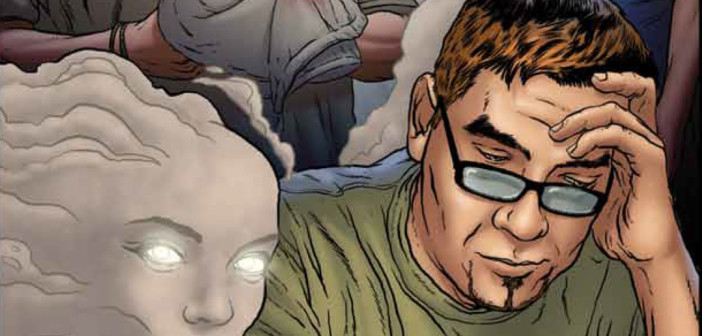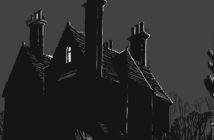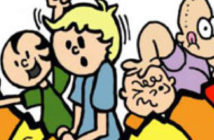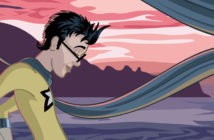Here is an interesting quote from the final psychedelic pages of Alan Moore and J.H. Williams’ Promethea: [Carl] Jung’s theories, viewed by mentor Sigmund Freud as dangerously close to occultism, suggested gods were archetypes recurring through the Mass Unconscious.” In accordance with this, it’s often been said that men and women create gods and goddesses in their own image, and not the other way around.
I’m reminded of these blurbs because of Nikola Jajic and Rick Hershey’s Loosely Based, a small graphic novel to be released by Arcana Comics in August 2010. It’s a story that toys with fact and fiction, what’s real and what’s not. By the time the book reaches its conclusion, there’s a slight feeling of confusion that only a house of mirrors can induce; there’s no certainty of where reality ends and the imagination begins.
Loosely Based follows the life of Duncan Moreno, a famous author who has no trouble pumping out best-selling novels about murdering creeps and good-guy bartenders. But despite his wealth and fame, he’s saddled with a not-so-loving girlfriend who tosses around a lot of profanities and tries to make everyone’s lives miserable.
The problem: Duncan’s success isn’t his own. He invokes the aid of a muse: a literary wraith that inspires in him creativity. Yes, this is the premise of a short story in Neil Gaiman’s The Sandman, but the similarities end there. The muse provides the inspiration Duncan needs to write his novels, but this union of their minds is a type of creative copulation, as his characters come to life. And they’re not tricks of the mind—they’re literally alive.
Duncan first meets Trevor, the psychopathic killer from his novels who resembles a methamphetamine-loving Dexter Morgan. Though Trevor was killed off in the novels, he’s entered into the collective unconscious of Duncan’s readers, and this mixed with some muse magic, has given him life. And in order to stay alive, Duncan has to continue to write about him over and over again in his novels so he’s not forgotten. Trevor is violent in his requests, and spatters a lot of blood along the way.
This is where some of the troubles of the book begin. I admire writer Jajic’s premise, but at times he hits us too hard with the exact details of what he wants us to know and understand about the plot. Subtly is the key to a book like this. In the writer’s afterward, Jajic says that he wanted us to be sure that these characters were not a figment of Duncan’s imagination, something he sees to be a fictional copout. Understood, but when Trevor and Duncan meet for the first time, it’s far too loud and booming in spelling out exactly what’s going on. Jajic also has a penchant to overuse caption boxes filled with internal monologues when artist Hershey’s illustrations are more than enough to convey the moods and tones of the book. Sometimes a picture really is worth a thousands words, and overwriting can be a hindrance instead of a help.
One notable character I appreciated was Frank, another fiction-to-fact persona of Duncan’s. He’s the moral levity of the story, but that’s not why I was fond of him. Loosely Based is filled with a lot of unlikable people. I don’t know if this was intended or not, but Duncan is not someone to root for, nor is Maggie. Duncan’s assistant is servile, and a private investigator he hires deserves what’s coming to him. Trevor is evil too, but he’s almost likable for it. There’s an offbeat scene where the killer hosts a small dinner party in his underwear, but his two guests are actually on the menu to be carved up.
Apposed to all of this is Frank, who Duncan doesn’t trust; he’s convinced the friendly bartender wants his life prolonged, too. This caused me to ask why: If Trevor is exactly in reality as he was in fiction, then why wouldn’t Frank be the same way? Duncan should know he can trust him, as he created him and his personality. And in fact, Frank can be trusted because he saves the day. I won’t say what happens, but the post-climax part of the book is when I liked Loosely Based the most. I liked seeing Frank and Duncan get along, like a real father and son, instead of all of the swearing and violence (which, I admit, I enjoyed for the most part). The end struck at the heart of Jajic’s premise with a sweet poignancy.
Loosely Based is a flawed but interesting book, filled with wonderful art by Rick Hershey, art that reminded me more than once of Tony Harris. I don’t know if this is Jajic’s first long-form graphic novel, but I hope he continues to write. He clearly loves the medium, and I can see his craft growing the more he works at it. This book won’t be for everyone, but it will have its audience.
This comic book review originally appeared on Broken Frontier.




